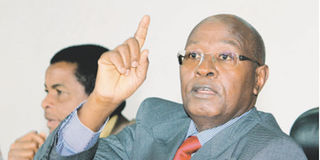Why taxman went back on deal with MPs

FILE | NATION
KRA commissioner-general Michael Waweru. The taxman is asking MPs to pay tax arrears on their income amid protests that there was an agreement to exempt them from taxation.
As public pressure mounts on MPs to pay tax arrears on their salaries, questions are emerging on why the taxman reneged on an earlier agreement that the current Parliament would be exempt from taxation.
The Sunday Nation has learnt that House Speaker Kenneth Marende iplans to meet top Kenya Revenue Authority officials over the matter. There are also concerns on whether Attorney-General Amos Wako misled KRA and Parliament in his opinion over taxation of MPs’ salaries under the new Constitution.
MPs, who return from recess on Tuesday, have threatened to frustrate the debate and passing of key Finance bills or force an early general election if the taxation decision is not rescinded.
Correspondence between KRA, Treasury and Parliament seen by Sunday Nation indiates that the taxman had pledged only the next Parliament would be liable to taxation.
A letter by KRA to Finance minister Uhuru Kenyatta indicated that the authority was relying on Mr Wako’s opinion, in which he argued that provisions of the new Constitution demanding taxation of all Kenyans would not have immediate impact on the structure operations—including emoluments and taxation— of the current Parliament.
The AG said his position was informed by regulation 10 of the Sixth Schedule of the Constitution.
In his opinion communicated to KRA before the referendum on the draft constitution, Mr Wako argued that Parliament would continue to be guided by taxation measures of the old Constitution.
“Although during this period of the National Assembly will operate for the purposes of this Constitution, it would not be operating under Chapter 8 but rather under Chapter 3, the Parliament chapter under the current Constitution,” he said.
Mr Wako said Chapter 3 of the old Constitution (on the Legislature) was retained under the new supreme law to preserve the terms of MPs in the current Parliament.
“The provisions of Chapter 8 of the proposed Constitution are suspended until the final announcement of all results if the first elections for Parliament under the new Constitution,” he advised.
It is on the basis of this opinion that taxman wrote to Treasury pledging that the MPs would not be taxed.
“KRA notes the attorney-general is the principal legal adviser to the government and his opinion is the binding legal position.
The authority will maintain the tax structures of members of the National Assembly,” said KRA commissioner-general Michael Waweru.
The letter of “clarification” to Mr Kenyatta dated July 20, 2010 then concluded: “We will continue to apply the provisions of National Assembly Renumeration Act in relation to taxation of the salaries and allowances of members of the current Parliament.”
But Prime Minister Raila Odinga, who has paid his tax arrrears, dismissed the KRA commitment as a “gentleman’s agreement”, which cannot be superior to the Constitution.
The Commission for the Implementation of the Constitution (CIC) has rubbished Mr Wako’s opinion, maintaining that the MPs are not exempt from paying taxes. The Sunday Nation has learnt that this assertion triggered the drive by KRA to demand taxes from the MPs.
CIC chairman Mr Charles Nyachae says the Article 210(3) of the Constitution is clear that all State officers must pay tax on their income.
“There are many State officers. It is not just specific on MPs. That provision is not among the suspended ones under the Sixth Schedule. It therefore means it became operational from the promulgation day,” he said.
He argues that if the intention of the Constitution was to shield the MPs from taxation, then there would be an express provision to that effect.
But the Speaker has maintained that taxation of MPs is guided by National Assembly Remuneration Act.
Mr Marende said taxation of MPs amounts to review of an employer’s salary midstream and applying the law backwards.
“We stand guided by the laws of the land.
It is important for all to read and interpret the Constitution in totality, including the provisions of the Income Tax Act, the National Assembly Remuneration Act, the Finance Act and any other laws, which to date have not been amended nor repealed to realise provisions of the Constitution,” he said.
“Members of Parliament pay tax as required by all existing laws, beginning with the Constitution, and will continue to do so including payment of additional tax if the law so provides and the requisite assessment is made.”
The Parliamentary Service Commission, which he chairs, has planned meetings with key players on the taxation matter.
MPs angered by the demand for tax arrears on their salaries have threatened to “punish” President Kibaki, Prime Minister Raila Odinga and Vice-President Kalonzo Musyoka by pushing them out of office for what they describe as “betrayal and dishonesty”. The three have remitted their tax arrears.
The MPs accused the coalition leaders of “lying” to Parliament and maintained that their interpretation of the Constitution—articulated in Mr Wako’s opinion to Parliament in 2010—was that the current Parliament was exempt from the new taxation measures.
“Once the new constituencies are in place, we will trigger fresh elections. Our opinion is that the principals have more to lose than MPs by going to the polls. More than 70 per cent of MPs are financially stable and don’t fear elections,” said Yatta MP Charles Kilonzo, who is among those spearheading the campaign.
Mr Kilonzo indicated they want the elections held latest by October. But it is not clear how it would be possible to hold elections by that time.
Though Parliament has enacted the relevant law, the Independent Electoral and Boundaries Commission is yet to be established.




